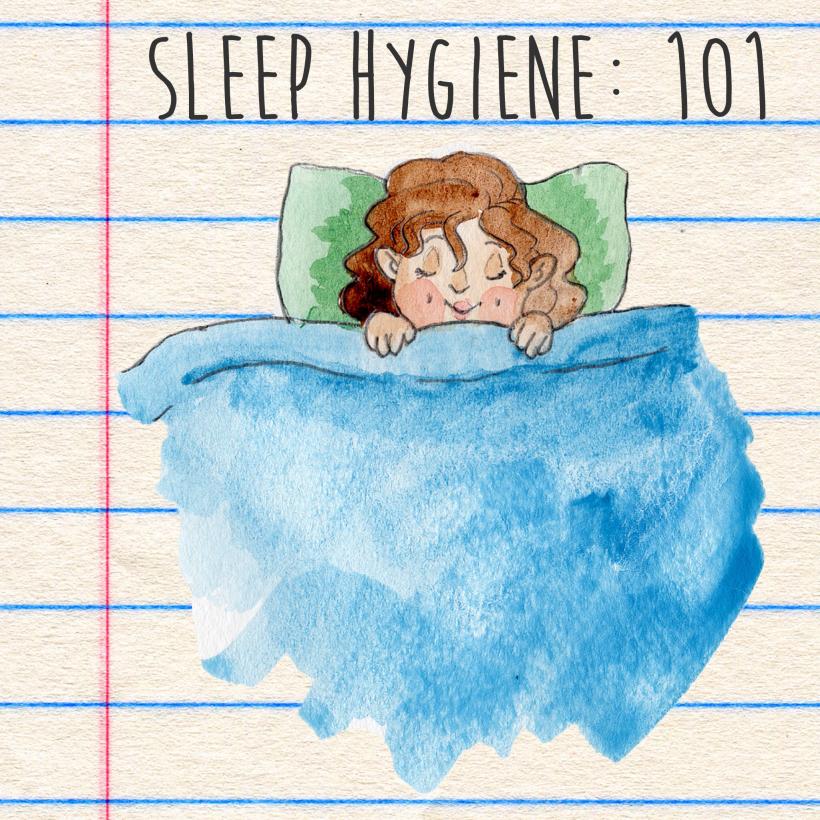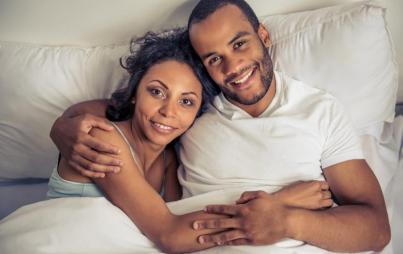
image credit: Mariah Aro Sharp @mightymooseart
A bipolar, body-positive bread enthusiast with a fucked-up pretty much healed ankle and a history of disordered eating chronicles health, weight-loss, and gardening. No diets allowed.
The first time my psychiatrist asked me about my sleep hygiene, I thought he was talking about actual hygiene. It seemed weird that he was worried about whether or not I regularly shower, but sometimes psychiatrists ask weird questions. (Also, I don’t wear deodorant, so that’s kind of a fair question.)
As it turns out, sleep hygiene actually has nothing to do with whether or not I wash my armpits. Sleep hygiene refers to any of the life practices and environmental factors that encourage healthy sleep habits and daytime alertness.
I’ve talked about how important sleep is; there are few things that factor into your well-being as much as sleep (except water).
Speaking of which, print this out and put it in your bathroom:
Anyway, the importance of sleep cannot be overstated. The amount and quality of our sleep impacts literally every hormone in our bodies. Since hormones are always busy regulating our bodily functions, we prefer them to be working smoothly and at full capacity.
If you find that you are not sleeping well, sleep hygiene might be just what the doctor (or psychiatrist) ordered. It made a difference in my quantity and quality of sleep, which made a difference in my mood, which made a difference in my relationships, which is about the most important aspect of my daily life (less crazy=less fighting with partner).
Sleep hygiene is an all day thing really; you start setting yourself up for good sleep as soon as you get out of bed.
Here are some important factors (in no particular order):
1. Exercise
Do some. I know everyone acts like exercise is the answer for everything, including depression, anxiety, intestinal gas, and bad hair days, but exercise is actually really important.
Be careful when you do it though — 7 am, yes, 9 pm, no. A late night rush of endorphins will help you stay awake to fold laundry, but it’s not going to help you sleep.
And speaking of endorphins…
2. Television
Ideally you’d be avoiding any screen time up to two hours before bed. But especially avoid things like Law & Order SVU or that Mel Gibson movie where he runs around in a kilt killing people.
Your brain will not respond well to seeing Mel Gibson killing people. If you have to watch TV before bed, watch Neil DeGrasse Tyson. Soothing voice. Science.
Here you go. Just close your eyes and let the sounds of Neil talking about the cosmos lull you into dreamland.
3. Watch out for the phone.
Looking at our phones is a thing many of us do before we turn in. As previously mentioned, you’d be best to avoid your phone.
There are a few reasons for this, but the primary one (right up there with talking politics on FB) is the light. The blue light emitted from your phone messes with your melatonin.
You do not want to mess with your melatonin.
If you MUST argue on FB, your iPhone has a setting to help.
Here it is!
Another option — these super sexy blue light blocking glasses.
4. Routine!
This is a big one for me. My nighttime routine never changes, and if it does, I am a mess.
This is what I do, and in this order.
1. Shower
2. Dry off and do facial routine (mask, scrub, moisturizer, whatever I’m doing that day)
3. Floss, brush teeth.
4. Take nighttime meds.
5. Lotion hands and apply lip balm.
6. Pull out my cooling pads and have them ready.
7. Hop into bed and read a bit.
8. Meditation/progressive relaxation.
9. Sex.
10. SLEEPS
Whatever you want to include in your routine is good. Just leave out caffeine and too much fluid.
5. Caffeine/Fluids
Limit fluids in the evening (starting two hours before bed) so you don’t have to pee every hour. Unless you’re pregnant, in which case you’re screwed.
Don’t drink caffeine after 4 pm. Just trust me.
6. Food
Don’t eat right before bed. Your body doesn’t need any calories to sleep, and the insulin spike will not help matters. If you are hungry, reach for fat or protein (seriously, just eat a spoon of coconut oil, and you’re solid).
7. Naps
Limit daytime napping to 20 minutes or less.
I really like this little app, Pillow. You can set an alarm which will give you just the right length of cat nap by sensing your breathing rate, depth, and pattern. It’s also got some sweet-ass meditative music and streams and shit to help you get to sleep (in case you’re not in the mood for Neil).
Pillow also has settings for restorative and recovery naps.
Science is so weird/cool.
It should be noted that long periods of daytime sleep do not make up for poor nighttime sleep. Yep. Sorry. Napping isn’t a solution. This can actually make your nighttime sleep worse.
8. Progressive relaxation
This is a thing I do before bed. Start at your head and work your way down your body, noting the level of tension in every muscle, and releasing it. Sometimes I tense and release the muscle to make sure it’s all chill.
Here’s a great video (but just listen, don’t watch).
9. Music/nature sounds/Deepak Chopra whispering sweet nothings in your ear
Whatever your poison, sometimes a little soothing sounding before bed can help.
I like the ocean. If your partner doesn’t like sleep sounds, try this: put your phone under your pillow! Pillows aren’t speakers or anything, but the sounds do seem to transmit without disrupting your bed buddy.
Here is one I like:
10. Schedule
If you’re the type that likes to party on the weekend, you aren’t going to like this. Your body wants a routine. It wants you to wake up and go to bed at the same time every day. In an ideal world, this is 6:30 am and 10:30 pm.
My spiritual boo, Deepak Chopra, told me (I mean, not ME personally, but let me have this one okay?) that the ideal time for bed is 10 pm, with onset of sleep prior to 10:30. This is based on ancient Ayurvedic practice.
And if you don’t think Ayurveda is real, ask the 1 billion Indians who have practiced it. Be prepared for an Ayurvedic smackdown (which is basically a warm sesame seed oil massage).
11. Environmental control
This include things like a comfortable sleeping temperature (a room that is neither too hot nor too cold), comfy pjs/bedding. Like it cool? Keep it cool. Have night sweats? Here are some tips to help with that.








